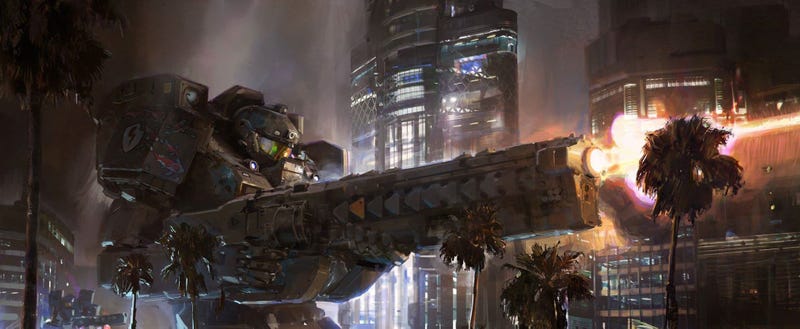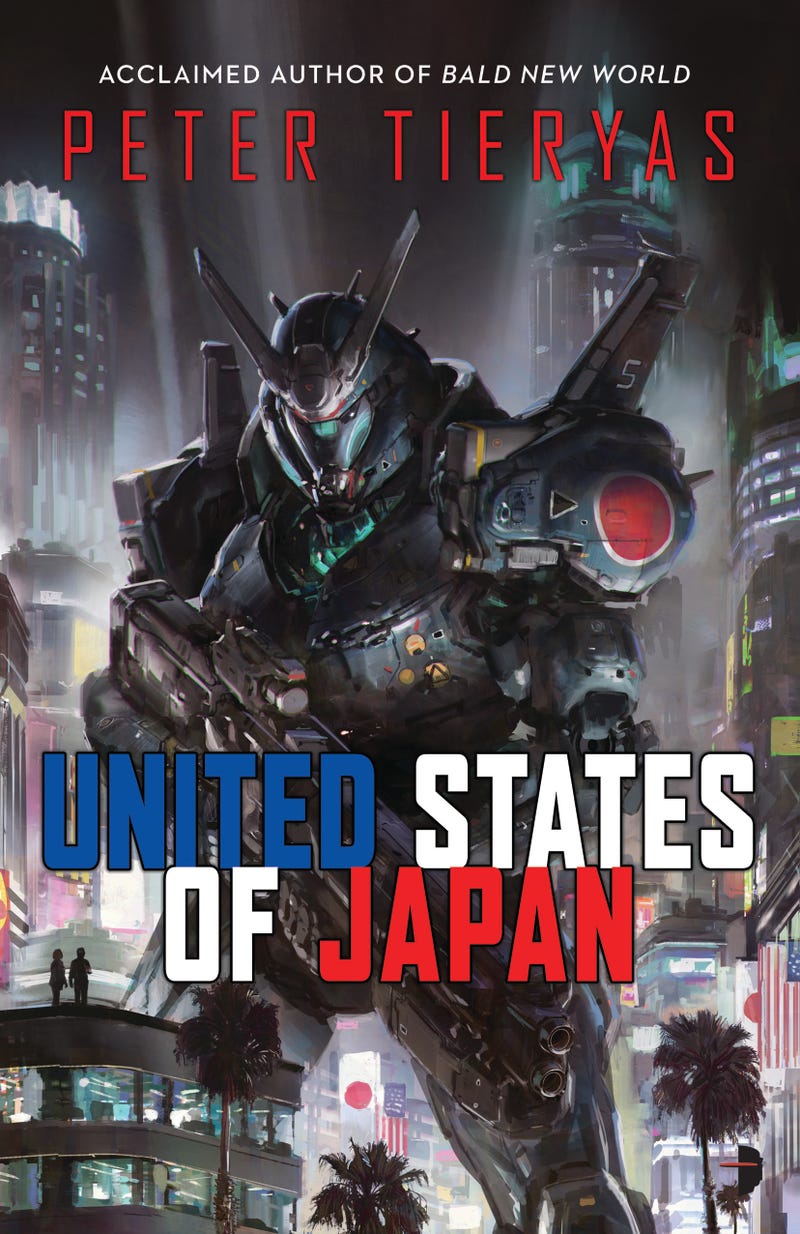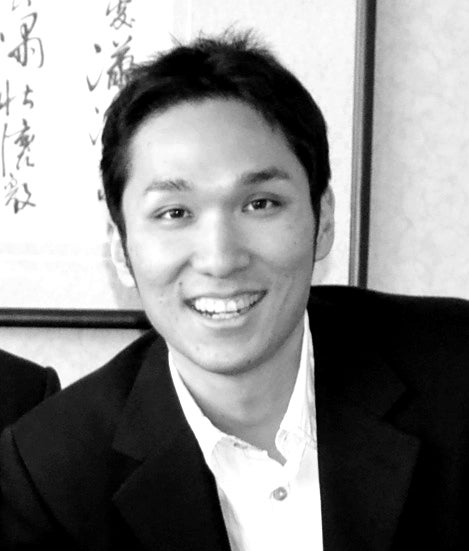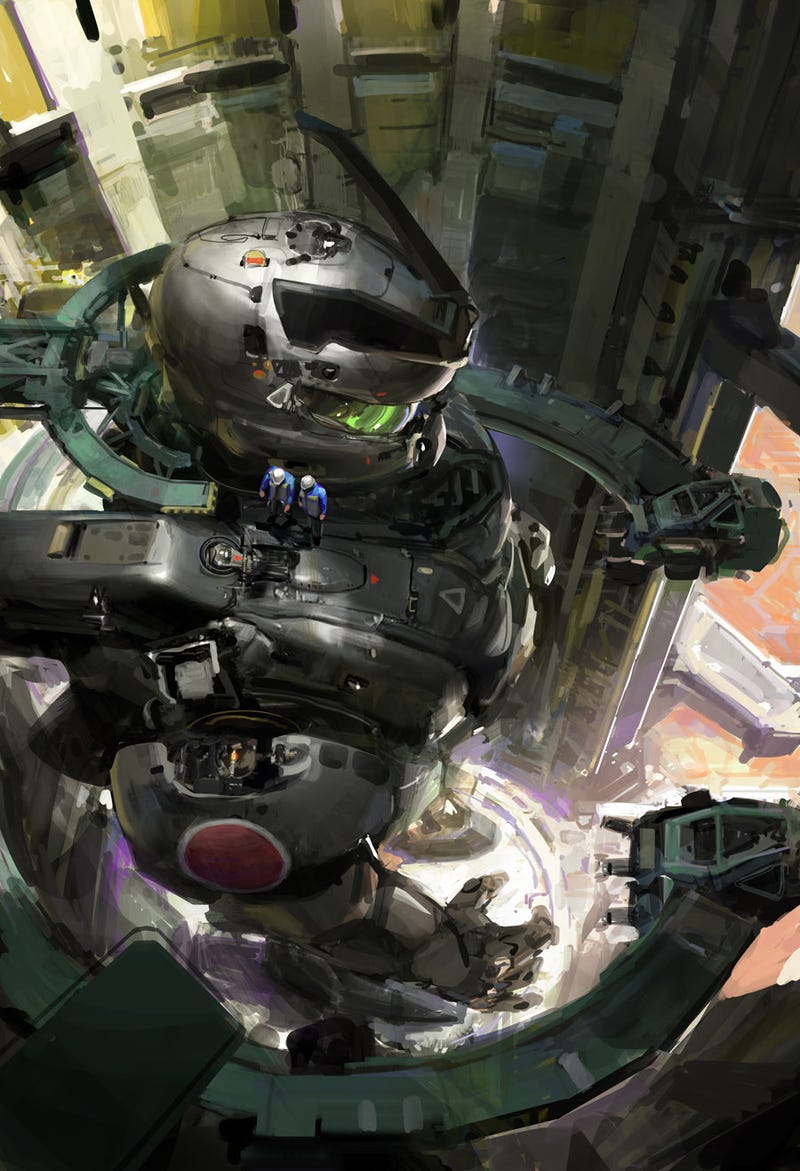
When we assembled our list of books that we were pumped about coming out in 2016, one particularly stands out: United States of Japan, billed as a ‘spiritual successor of The Man in the High Castle’. It’s got giant mechs, alternate history, and did I mention giant mechs?
United States of Japan arrives in bookstores this coming week, and takes place in an alternate history where the United States loses World War II. Fast forward to the 1980s, where a subversive video game is taking hold, and one soldier, Captain Beniko Ishimura, is tasked with tracking down the makers, only to discover that there’s more to the story.
http://www.amazon.com/United-States-...
Peter Tieryas previously wrote Watering Heaven and Bald New World, and has worked in the film industry as a VFX artist (with films like Men in Black 3, Guardians of the Galaxy, Alice in Wonderland, and Hotel Transylvania on his resume) and has worked as a technical writer for LucasArts.

Your novel, United States of Japan is billed as a ‘spiritual sequel’ to Philip K. Dick’s Man in the High Castle: what prompted you to write your book, and how did you steer clear of simply copying PKD’s book?
I’ve always been a fan of Philip K. Dick, but it was during my time going to school at Berkeley that my interest in him really grew. He was describing places I was familiar with, ideas that I could relate to as I spent those early years debating with professors about metaphysics and existence. The Man in the High Castle stood out for me because it focused so much on the humanity of the people through extremely difficult times. Obviously, I didn’t live in an authoritarian system, but I was struggling just to get by because of some big financial difficulties. As one of the characters, Mr. Tagomi, puts it: “We are all insects. Groping towards something terrible or divine.”
More than a decade later, I revisited all of PKD’s books including High Castle. I was surprised to find out he wanted to write a sequel. Unfortunately, writing the sequel took a mental toll as he had to dive back into the psychology of Nazis which is why, he explained, “I’ve never written a sequel to it: it’s too horrible, too awful.”
I understood his feeling all too well. I’d wanted to write a story revolving around the tragic events on the Asian side of WWII and had been researching the material for several years. This was because I heard so many stories about the Japanese occupation of Asia growing up, like how women in the Qingdao area covered their faces with mud so they couldn’t get kidnapped by Japanese soldiers. I spent two years in Korea as a kid, and some of the elders I met could speak fluent Japanese and even had Japanese names which they were given as children. They really didn’t like the fact that I loved playing my Nintendo, only because it was from a Japanese company. I didn’t know why back then, but I was shocked when I later learned that 17-22 million civilians were killed in the Pacific War and many others were imprisoned, tortured, and enslaved. The more I delved into the research, the more I read about suffering on all sides. I was haunted by the stories of survivors, thinking about how much they’d endured. Then I wondered why so few here in the States knew about that past.
When I heard PKD wanted to do a sequel, the idea of attempting a spiritual sequel took root. I wanted to make sure in some form, those Asian stories from WWII were told here in the west. But in USJ, I’m not trying to redress the past because it’s about more than the Imperial Japanese Army, which is very different from current Japan. It’s a look at authoritarianism and the way a military state affects its people across different nations.
Japanese culture has had a huge influence for me growing up. There’s so many films, books, and games I love that have heavily influenced me. At the same time, I wanted to use historical facts as a launching point for any speculative elements in the writing, including the way the IJA carried out warfare in all its bloody brutality. War is ugly and there’s no glossing over that.
I also wanted to address simple cultural facts that I thought would make the book more authentic. Take the I Ching which is a crucial part of the book. When PKD actually asked the Japanese translator what he thought about High Castle, the response was a blunt: “You’ve also confused Chinese culture and Japanese culture… The I Ching’s Chinese and not Japanese. No Japanese would ever use some Confucian classic. Only foreigners use those.” Even when I spent a few years in China, I never saw anyone use the I Ching the way they did in High Castle.
USJ was also about trying to answer many of the questions I had after first reading The Man in the High Castle. How different would gaming, the internet, and social customs be following a fusion of two very different cultures after fifty years of Japanese imperial rule? Would they have their own version of a Vietnam War, a battle quagmire that resulted in stalemate and a soul searching identity crisis? Would they wonder about the moral ramifications of having used an atomic weapon on America, the same way Americans have wondered about Hiroshima and Nagasaki? What would the religious face of the surviving Americans be like, forced to acknowledge the Emperor as a living god? Having the story take place in the late 1980s would also mean most of the people who lived through the war were dead. To this new generation, imperial rule was a fact of life, giving it a completely different feel as well.
Finally, speculating on the alternate world technology was part of the challenge and joy of writing USJ.
That includes biochemical advances made possible by human experimentation, an elaborate system of regulating people based on gaming habits, and gigantic mechas, a result of one of my childhood passions- gigantic robots.
What about Man in the High Castle appealed to you when you first read it? What’s stuck with you out of the book?
When I first picked up High Castle, I was expecting something like Wolfenstein. Lots of Nazis fighting Americans and wild science fiction twists and turns in PKD fashion. Instead, I got something that was almost akin to a spiritual journey revolving around the internal struggles of an imperfect cast of characters. I admit, the first time I read it, I liked it, but didn’t fully grasp what PKD was going for. I later realized his message resonated at a deeper level. Surrounded by all these evils, how do people survive and preserve their humanity when society is so inhumane? Everyone handles it in different ways, and it was this struggle that appealed to me the most. Even though PKD and I are different writers, I really tried to capture that spirit in USJ. I also thought the ending had an ambiguity that was unexpected and haunting. It left me wanting to know more about the universe and what happened a few decades later.
Rather than a novel, your characters work with subversive video games: what games in particular inspired you here? How did your background in the film and gaming world help you here?
One of the biggest personal experiences that influenced USJ was my time working at EA in Los Angeles. They were most well known for their Medal of Honor games and were just branching out into other franchises. I was hired to work on Goldeneye, but many of my friends were working on Medal of Honor: Pacific Assault. I was so amazed by the level of talent and their dedication to getting all the facts about the war right. The iterative process was mind-numbing as they sought feedback from so many different sources. This was also when the LA studio was beginning to expand and it felt like such a vibrant and amazing place. It wasn’t all great, and I can’t attest to the quality of the games, but the artists and engineers were mostly top-notch. It was a really amazing time behind the scenes and I formed many close friendships then. I also got to hear lots of stories about game development in Japan and stories about famous developers, many of which were illuminating.
One of the moments that still strikes me was the first time I was playing around in the game engine. It was much more clunky then, not like now where Unreal, GameMaker, and Unity are very intuitive to pick up and use. I did some basic AI pathing, placing units and what-not. I was surprised that the rudimentary logic which seemed simple when I designed it was breaking so easily. Even getting a unit to traverse from point A to B to C using flags would get disrupted by terrain or enemies. The AI had a life of its own, interpreting my commands in ways I hadn’t expected. It was like I got a glimpse of the universe and how complex all its rules were in interaction.
A lot of these thoughts were on my mind as I wrote about the simulation in the game that the Empire uses to plan their various battle tactics. Gaming is no longer a civilian effort, but a military one, falling under the department of propaganda. One of the two main characters, Ben Ishimura, has the role of being a game censor. So I definitely drew on my background in gaming to capture the details of the company and the way the engine works.
As for which games inspired me, Civilization was a big one (interestingly enough, Civilization also inspired Iain M. Banks’s Excession). Also, an older Sega Genesis game called Herzog Zwei, Shining Force, Metal Gear Solid, Katamari Damacy, multiple first person-shooters, MMOs, and so many more.
About a year or so ago, we got to check out a test kit of the Oculus Rift. When I put it on, I felt like I was in a futuristic hangar bay and tried to move forward, only to crash into a cubicle. I was amazed by the technology and wondered, what if this was available to people twenty years ago? Since gaming has almost unlimited funds from the Empire in USJ, there would be a lot more resources allocated to it as well. I had a lot of fun writing and speculating on those sequences, and frequently had to pull myself back from going too wild with the ideas because I was enjoying them so much.
What appealed to you the most in writing an alternate history of the United States losing the Second World War?

Getting to play Legos with history. I assembled, broke up, reassembled, and conjured up a whole new timeline. Some elements are sinister and others take on completely different connotations that shed light on contemporary events. I’ve mentioned video games and entertainment. I wanted to venture into some of the more complicated historical issues like the internment of Japanese-Americans, the Cold War, and alternate versions of political battles. Even if the nations and players are different, are people still the same? Do historical patterns change that dramatically, or are they the evolution of geopolitical shifts that would have inevitably happened? One instance is where proxy wars happen between the Nazis and the Empire, both afraid that capitulating in a smaller country would lead to a domino effect, the same way America fought with the Soviet Union.
There are three major forces in play in the book; the USJ, Nazis, and Americans rebelling as the George Washington group. Each have their own version of history that strays from facts to serve their own purposes. Finding out who’s speaking the truth is part of the jigsaw the characters (and readers) are trying to uncover.
Akiko Tsukino and Beniko Ishimura are our eyes and ears in this world, but they also represent different modes of excavation for the alternate history. Akiko is a member of the secret police who strongly believes in the Emperor and enforces his decrees religiously. Her fervor represents those who follow blindly, convinced the Emperor is divine. Ben is a veteran who takes comfort in the vices the Empire offers, wanting to lose himself in pleasures rather than deal with the gritty reality. Having lived through one of the worst civil revolts in the USJ’s history, he is torn by guilt from his past actions. The two form an alliance but are constantly at odds with each other. Their philosophical divide is the dialogue that informs the story, driving it forward.
You place an interesting focus on the racial tensions between the Japanese and Americans, and you speak quite a bit to cultural identity. What did you draw on for this?
High Castle was the first source. PKD touches upon how the Japanese have become the predominant race and one of the characters, Robert Childan, really wants to fit in with a Japanese couple. Being Asian actually meant you were in a position of privilege. That was a really interesting theme I wanted to expand upon and explore. The two main characters, like many throughout the USJ, are of mixed ethnicity; Agent Akiko is half-French, half-Korean, and Captain Ishimura is part-Japanese, part-Chinese. When the non-Japanese Americans demand more rights, their protests are violently crushed. Segregation exists where Japanese have their own bathrooms and seats on subways, and everyone else has to make way for them (unless you’re military). Even the fact that Ben is half Japanese means he gets privileges others don’t.
Everyone else is dismissed or viewed as a threat.
I hoped by portraying this contrast, readers could view the current racial dynamic in a different light. In discussing most elements of racism in the past, it’s usually from an anglo-centric view. How would those issues be viewed if told from a non-anglo perspective with non-POCs being subjected to racial discrimination? Would the discussion have more immediacy? Or would it come across as offensive? If offensive, why is it not offensive when talking about POCs in the same light?
At the same time, it’s important that my role focus on telling the story and letting the reader make their own conclusions. In USJ, I’m not trying to persuade readers one way or another. Rather, to posit questions and, hopefully, make them wonder.

What did you think of the Amazon.com series for Man in the High Castle?
There were two reasons I nearly gave up writing United States of Japan. The first was because I was afraid of the controversy it would engender tackling what is a really sensitive time of history among Asians (even now, it’s an interesting divide among readers familiar with the history of WWII and those not, the latter commenting on the violence in the book, while the former mentioning how empathetic and fair it is). I knew I wanted to be respectful in drawing on that history and spent a lot of time editing it to make sure we maintained that.
The second was when I heard they were making a television show based on the book. When I first began writing USJ a few years ago, there wasn’t a show yet. But then I heard the show was getting made and I asked myself, should I stop? Then I heard Syfy decided not to go forward with it and so I plunged into USJ which was around 2013. I was halfway through when I heard that Amazon had greenlit a pilot for the show. Again, I wondered, should I quit? Would people accuse me of just being derivative? But I knew the ideas I had were different enough where they could stand alone and as it was just a pilot, there was no guarantee a full season would get made. By the time I finished in late 2014, I knew they were going to make a season out of the book. I wasn’t sure if this would hurt my chances so I sent it to Angry Robot who, fortunately, accepted it. I felt I wanted to acknowledge the obvious inspiration source, kind of like how Brazil gives nods to 1984, L.A. Confidential gives nods to Chinatown, and even Soldier places itself next to Blade Runner (sorry about the last example!). But my sensitivity to the High Castle has precluded me from watching the series up until now, especially because I don’t want to be influenced by the show, even on a subconscious level. Having said that, I really want to see it and come USJ’s release in a few days, one of my very first rewards is to watch the show in its entirety.
What do you have coming up next?
For my next book, I’m doing something a little more light-hearted and humorous. I’m hoping it’s a fresh take on the detective story, only injected with science fiction elements and mysteries revolving around temporal anomalies. It’s something I’ve been working on for over a decade and hearkens back to some of the very first science fiction stories I fell in love with which were by Cordwainer Smith. It was because he spent so much time in Asia and integrated many of the Asian myths/stories I grew up with into his work that I enjoyed them so much. His wild tales about the Instrumentality and telepathic cat pin-lighting pilots and sense-destroying scanners have always stuck with me. I mention this also to point out how the genre has evolved and I’m so excited to see the way writers are pushing the boundaries of narrative. Ken Liu’s The Dandelion Dynasty, Wes Chu’s Tao series, Aliette de Bodard’s House of Shattered Wings, are a few examples of absolute brilliance, and there’s so many others.
I would also love the opportunity to jump back into the world of United States of Japan. This time though, I want to tell a wholly original story without being bound/restricted in an attempt to pay tribute to High Castle nor the Asian tale I’d initially wanted to tell (which I did in USJ). The sandbox is in place.
Time to set things on fire.
Follow the author on Twitter at @andrewliptak